
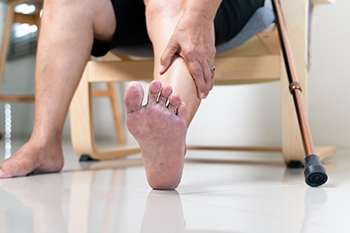
Foot pain is a common complaint as people age, often resulting from years of wear and tear on the feet, toes, and ankles. Age-related foot issues include bunions, stress fractures, osteoarthritis, plantar fasciitis, and collapsed arches. These conditions can arise as the soft tissues lose elasticity, bones weaken, and joint cartilage wears down. Women are especially prone to developing foot problems due to factors such as hormonal changes and a higher likelihood of bone density loss later in life. In addition, high heels, often worn for many years, can increase pressure on the front of the foot and contribute to deformities and pain. A podiatrist can diagnose the source of your foot pain and recommend medical treatment, including custom orthotic devices, bracing, or injections to reduce inflammation and relieve pressure. In some cases, surgery may be necessary to correct deformities or repair damaged tissues. If you have foot problems related to aging, it is suggested that you schedule an appointment with a podiatrist for appropriate treatment.
If you need your feet checked, contact Dr. Stephan J. LaPointe of Georgia Foot & Ankle Specialists . Our doctor will attend to all of your foot and ankle needs and provide you with quality treatment.
Geriatrics and Podiatry
When people age, some common issues that may occur are bone density loss, dry skin, poor circulation, and rough brittle nails. These issues may also affect your foot health if the necessary steps are not taken to alleviate the problems.
It is important to take care of your feet because feet that are injured or diseased can affect your overall health. Having painful feet hinders your ability to do daily activities or may decrease your willingness to do the things that you need to do.
Visiting Your Geriatrician
As we age, health problems become more likely, so it is essential to visit your doctor for check-ups to ensure that you are doing the best you can to take care of your health. It is recommended to check your feet frequently for any possible cuts, bruises, swelling, corns or any other irregularities.
Taking Care of Elderly Feet
Cracked or dry feet can be treated by applying moisturizer often. It is also important not to wear old socks because the older the sock is, the higher the possibility there will be that there is bacteria there. Wear fresh socks and make sure they fit properly.
Proper foot health means that you can have a more active lifestyle and you will not be bogged down by pain. Foot health also leads to good circulation, which is paramount for overall health.
If you have any questions, please feel free to contact our office located in Rome, GA . We offer the newest diagnostic tools and technology to treat your foot and ankle needs.
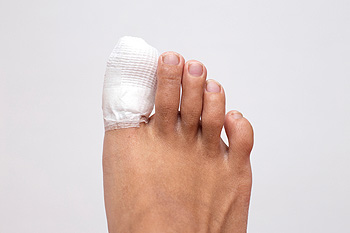
A broken toe might seem minor, but it can be surprisingly painful and disruptive. Toe fractures happen from direct impact, like stubbing a toe on furniture, dropping something heavy on it, or even excessive stress from repetitive movements. There are different types of toe fractures. A stress fracture develops over time from repeated strain, common in runners and athletes. A non-displaced fracture means the bone has cracked but remains aligned, while a displaced fracture occurs when the bone shifts out of place. A comminuted fracture involves multiple breaks in the same bone, and an open fracture means the bone has pierced the skin, requiring immediate medical attention. Treatment depends on severity, ranging from taping the injured toe to its neighbor for stability to wearing a stiff-soled shoe. Severe cases may require a splint or even surgery to ensure proper healing. If you have severe pain from a broken toe, it is strongly suggested that you schedule an appointment with a podiatrist for appropriate treatment.
Broken toes may cause a lot of pain and should be treated as soon as possible. If you have any concerns about your feet, contact Dr. Stephan J. LaPointe from Georgia Foot & Ankle Specialists . Our doctor will treat your foot and ankle needs.
What Is a Broken Toe?
A broken toe occurs when one or more of the toe bones of the foot are broken after an injury. Injuries such as stubbing your toe or dropping a heavy object on it may cause a toe fracture.
Symptoms of a Broken Toe
Although the injured toe should be monitored daily, it is especially important to have a podiatrist look at your toe if you have severe symptoms. Some of these symptoms include worsening or new pain that is not relieved with medication, sores, redness, or open wounds near the toe.
If you have any questions, please feel free to contact our office located in Rome, GA . We offer the newest diagnostic and treatment technologies for all your foot care needs.
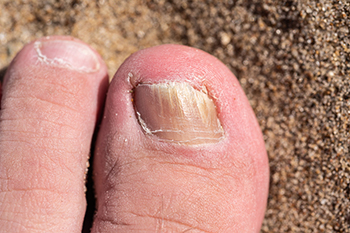
Fungal toenail infections usually begin at the tip or sides of the toenail and may cause discoloration, thickening, and crumbling of the nail surface. In some cases, the nail may lift from the nail bed or become painful if the surrounding skin becomes inflamed. While fungal toenail infections are common, they can be difficult to clear without medical treatment. A podiatrist can examine the toenail and confirm the infection through a laboratory test. Based on the findings, oral antifungal medication may be prescribed, often requiring several months of consistent use. These medications target the infection from within and support the regrowth of healthy nail tissue. Because oral antifungals can affect liver function, a podiatrist may request blood tests before and during treatment. If the infection is severe and the nail is extensively damaged, surgery to remove part or all of the nail might be recommended. This can help eliminate the infection and allow a clear nail to grow back. If you believe you have a toenail infection, it is suggested that you schedule an appointment with a podiatrist for an exam, diagnosis, and treatment.
For more information about treatment, contact Dr. Stephan J. LaPointe of Georgia Foot & Ankle Specialists . Our doctor can provide the care you need to keep you pain-free and on your feet.
Toenail Fungus Treatment
Toenail fungus is a condition that affects many people and can be especially hard to get rid of. Fortunately, there are several methods to go about treating and avoiding it.
Antifungals & Deterrence
Oral antifungal medicine has been shown to be effective in many cases. It is important to consult with a podiatrist to determine the proper regiment for you, or potentially explore other options.
Applying foot powder on the feet and shoes helps keep the feet free of moisture and sweat.
Sandals or open toed shoes – Wearing these will allow air movement and help keep feet dry. They also expose your feet to light, which fungus cannot tolerate. Socks with moisture wicking material also help as well.
If you have any questions please feel free to contact our office located in Rome, GA . We offer the newest diagnostic tools and technology to treat your foot and ankle needs.
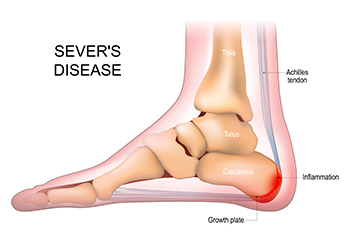
Sever’s disease is a common cause of heel pain in growing children, particularly those who are active in sports. It occurs when the growth plate in the heel becomes inflamed due to repetitive stress and tension from the Achilles tendon. This condition is most common during periods of rapid growth, when bones lengthen faster than muscles and tendons can adapt. Causes include excessive running, jumping, and footwear that lacks adequate support. Symptoms include pain and tenderness at the back of the heel, swelling, and difficulty walking or participating in physical activities. The discomfort may worsen with activity and improve with rest. If your active child has heel pain, it is suggested that you consult a podiatrist who can accurately diagnose and manage Sever’s disease.
Sever's disease often occurs in children and teens. If your child is experiencing foot or ankle pain, see Dr. Stephan J. LaPointe from Georgia Foot & Ankle Specialists . Our doctor can treat your child’s foot and ankle needs.
Sever’s Disease
Sever’s disease is also known as calcaneal apophysitis, which is a medical condition that causes heel pain I none or both feet. The disease is known to affect children between the ages of 8 and 14.
Sever’s disease occurs when part of the child’s heel known as the growth plate (calcaneal epiphysis) is attached to the Achilles tendon. This area can suffer injury when the muscles and tendons of the growing foot do not keep pace with bone growth. Therefore, the constant pain which one experiences at the back of the heel will make the child unable to put any weight on the heel. The child is then forced to walk on their toes.
Symptoms
Acute pain – Pain associated with Sever’s disease is usually felt in the heel when the child engages in physical activity such as walking, jumping and or running.
Highly active – Children who are very active are among the most susceptible in experiencing Sever’s disease, because of the stress and tension placed on their feet.
If you have any questions, please feel free to contact our office located in Rome, GA . We offer the newest diagnostic and treatment technologies for all your foot and ankle injuries.
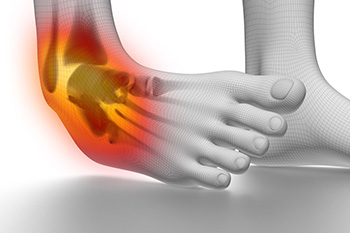
Ankle sprains are a frequent injury that can occur due to various factors. Wearing high heels often causes instability in the foot, making it easier to twist or roll the ankle, especially when walking on uneven surfaces. Rough terrain activities, such as hiking or running on rocky or uneven ground, increase the risk of rolling the ankle and straining ligaments. Uncomfortable landings, particularly in sports or other physical activities, can cause sudden twists or bends in the ankle, leading to sprains. Chronic instability, whether from previous sprains or weak ankle muscles, can make the ankle more prone to reinjury. Wearing more supportive footwear, strengthening the ankle muscles, and being cautious on uneven ground can help prevent sprains. An ankle sprain can cause severe pain and discomfort, causing difficulty in completing daily activities. If you have sustained this type of injury, it is suggested that you promptly seek guidance from a podiatrist who can effectively treat this condition.
Ankle sprains are common but need immediate attention. If you need your feet checked, contact Dr. Stephan J. LaPointe from Georgia Foot & Ankle Specialists . Our doctor can provide the care you need to keep you pain-free and on your feet.
How Does an Ankle Sprain Occur?
Ankle sprains take place when the ligaments in your ankle are torn or stretched beyond their limits. There are multiple ways that the ankle can become injured, including twisting or rolling over onto your ankle, putting undue stress on it, or causing trauma to the ankle itself.
What Are the Symptoms?
Preventing a Sprain
Treatment of a Sprain
Treatment of a sprain depends on the severity. Many times, people are told to rest and remain off their feet completely, while others are given an air cast. If the sprain is very severe, surgery may be required.
If you have suffered an ankle sprain previously, you may want to consider additional support such as a brace and regular exercises to strengthen the ankle.
If you have any questions please feel free to contact our office located in Rome, GA . We offer the newest diagnostic and treatment technologies for all your foot and ankle needs.
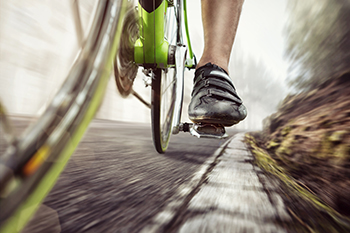
Cycling places repetitive stress on the feet and ankles, leading to various injuries and discomfort. Plantar fasciitis can develop from excessive pressure on the arch, causing heel pain and stiffness. Numbness in the feet may result from nerve compression due to prolonged pressure or improper positioning on the pedals. Metatarsalgia, a condition that causes pain in the ball of the foot, can occur from excessive force on the forefoot during pedaling. Poor shoe fit is a common cause of these issues, as tight or rigid shoes restrict movement and circulation, while loose shoes fail to provide adequate support. Proper footwear, cleat positioning, and adjusting saddle height can help prevent these injuries. Strengthening exercises and stretching can also improve foot stability and reduce strain during cycling. If you have sustained a foot or ankle injury from cycling, it is suggested that you consult a podiatrist who can offer effective treatment remedies, and guide you on additional injury prevention tips.
Ankle and foot injuries are common among athletes and in many sports. They can be caused by several problems and may be potentially serious. If you are feeling pain or think you were injured in a sporting event or when exercising, consult with Dr. Stephan J. LaPointe from Georgia Foot & Ankle Specialists . Our doctor will assess your condition and provide you with quality foot and ankle treatment.
Common Injuries
The most common injuries that occur in sporting activities include:
Symptoms
Symptoms vary depending upon the injury and in some cases, there may be no symptoms at all. However, in most cases, some form of symptom is experienced. Pain, aching, burning, bruising, tenderness, tightness or stiffness, sensation loss, difficulty moving, and swelling are the most common symptoms.
Treatment
Just as symptoms vary depending upon the injury, so do treatment options. A common treatment method is known as the RICE method. This method involves rest, applying ice, compression and elevating the afflicted foot or ankle. If the injury appears to be more serious, surgery might be required, such as arthroscopic or reconstructive surgery. Lastly, rehabilitation or therapy might be needed to gain full functionality in the afflicted area. Any discomfort experienced by an athlete must be evaluated by a licensed, reputable medical professional.
If you have any questions, please feel free to contact our office located in Rome, GA . We offer the newest diagnostic and treatment technologies for all your foot care needs.
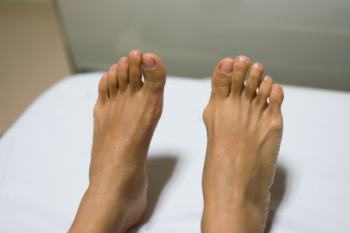
A bunion is a bony bump that forms at the base of the big toe, causing discomfort, swelling, and difficulty wearing certain shoes. It develops when the big toe shifts toward the others, often due to genetics, improper footwear, or foot mechanics. While bunions cannot be reversed without surgery, exercises can help strengthen the foot and reduce pain. Toe stretches improve flexibility and relieve tension. Pulling the big toe gently away from the others and holding for a few seconds helps maintain mobility. Arch lifts strengthen foot muscles by raising and lowering the arches while keeping toes on the ground. Toe curls with a towel improve grip strength and foot stability. These exercises, along with proper footwear, can ease discomfort. If you have a painful bunion, it is suggested that you see a podiatrist who can assess its severity, recommend custom orthotics, and provide additional treatments for long-term relief and foot health.
If you are suffering from bunions, contact Dr. Stephan J. LaPointe of Georgia Foot & Ankle Specialists . Our doctor can provide the care you need to keep you pain-free and on your feet.
What Is a Bunion?
A bunion is formed of swollen tissue or an enlargement of boney growth, usually located at the base joint of the toe that connects to the foot. The swelling occurs due to the bones in the big toe shifting inward, which impacts the other toes of the foot. This causes the area around the base of the big toe to become inflamed and painful.
Why Do Bunions Form?
Genetics – Susceptibility to bunions are often hereditary
Stress on the feet – Poorly fitted and uncomfortable footwear that places stress on feet, such as heels, can worsen existing bunions
How Are Bunions Diagnosed?
Doctors often perform two tests – blood tests and x-rays – when trying to diagnose bunions, especially in the early stages of development. Blood tests help determine if the foot pain is being caused by something else, such as arthritis, while x-rays provide a clear picture of your bone structure to your doctor.
How Are Bunions Treated?
If you have any questions, please feel free to contact our office located in Rome, GA . We offer the newest diagnostic and treatment technologies for all your foot care needs.
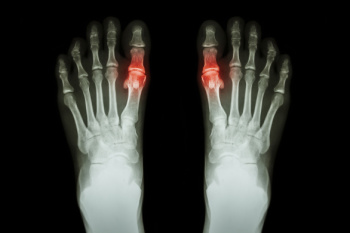
Juvenile gout is a rare condition in children where uric acid builds up in the bloodstream, leading to the formation of crystals that cause pain and inflammation in the joints. This condition is similar to gout in adults, but it occurs in younger individuals, typically affecting the big toe, knees, or ankles. The primary cause of juvenile gout is an overproduction of uric acid, often linked to genetic factors that cause the body to either produce too much uric acid or fail to eliminate it properly. Other causes include kidney problems, obesity, and certain medications. In some cases, a diet high in purine-rich foods, such as red meat and seafood, may contribute to the condition. Symptoms of juvenile gout include sudden joint pain, swelling, redness, and warmth, which can be quite severe. If your child has sudden pain in the big toe and other symptoms of gout, it is suggested that you promptly consult a podiatrist who can effectively treat this condition.
Gout is a foot condition that requires certain treatment and care. If you are seeking treatment, contact Dr. Stephan J. LaPointe from Georgia Foot & Ankle Specialists . Our doctor will treat your foot and ankle needs.
What Is Gout?
Gout is a type of arthritis caused by a buildup of uric acid in the bloodstream. It often develops in the foot, especially the big toe area, although it can manifest in other parts of the body as well. Gout can make walking and standing very painful and is especially common in diabetics and the obese.
People typically get gout because of a poor diet. Genetic predisposition is also a factor. The children of parents who have had gout frequently have a chance of developing it themselves.
Gout can easily be identified by redness and inflammation of the big toe and the surrounding areas of the foot. Other symptoms include extreme fatigue, joint pain, and running high fevers. Sometimes corticosteroid drugs can be prescribed to treat gout, but the best way to combat this disease is to get more exercise and eat a better diet.
If you have any questions please feel free to contact our office located in Rome, GA . We offer the newest diagnostic and treatment technologies for all your foot and ankle needs.